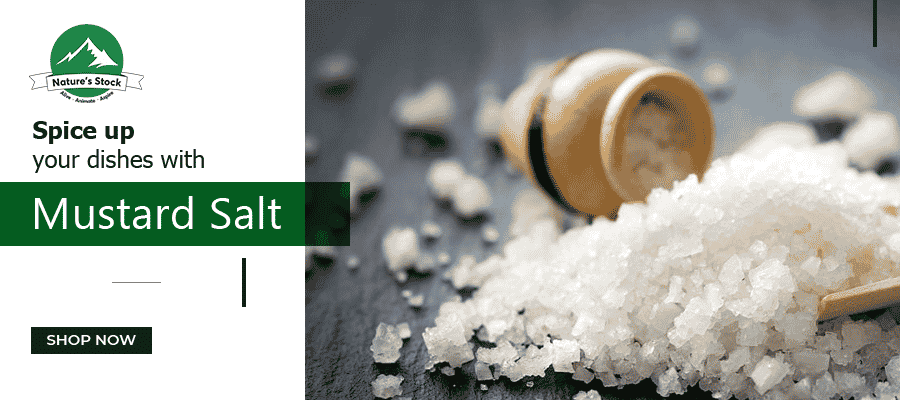Mustard Flavored Salt plant is any one of several plant species in the genera Brassica and Sinapis in the family Brassicaceae (the mustard family), Mustard Flavored Salt is something that can be easily found in the common household. We at Nature’s stock grew and curated the supreme quality of mustards, Mustard flavored salt that not only enhances the taste but also has many health benefits.
There are various mustard varieties made from other mustard seeds, such as brown mustard seeds (Brassica juncea) or black mustard seeds (Brassica nigra) (Brassica nigra).
Benefits Of Mustard Flavored Salt:
Mustard seeds are good for our health. They’ve been utilised in a variety of ayurvedic remedies to help with digestion. Here are some of the reasons you should include them in your diet:
1.) Prevents cancer and aging
- Mustard seeds are high in antioxidants, which help to keep your skin looking young and healthy. In the body, antioxidants bond to free radicals. If there are too many of these free radicals in the body, they can be exceedingly damaging.
- These free radicals have been related to a variety of ailments, including diabetes, heart disease, and cancer. They are high in glucosinolates and myrosinase, both of which prevent cancer cell proliferation in the body. Certain studies also believe that it aids in the destruction of malignant cells already present in the body.
- Mustard has a number of skin-care advantages. Mustard paste can be used to exfoliate the skin. Because it has antimicrobial characteristics, it can also be used as a facepack for acne sufferers. Mustard packs and scrubs assist to keep your skin moisturised while also lightening tans. Psoriasis sufferers utilize mustard seeds as a treatment. It can be used to treat a variety of skin illnesses, including ringworms.
2.) Aids digestion
Mustard seeds can help you feel better right away if you’re having digestive problems. It includes a high level of fiber, which is beneficial for constipation. Mustard seeds are high in nutrients that promote gut health and regular bowel movements. It benefits not only our digestion but also our metabolism.
3.) Good for heart health
Mustard seeds are also high in soluble fiber, which aids in the reduction of cholesterol levels. High blood cholesterol levels raise the risk of a heart attack. Mustard oil, which is extensively used in Indian families for cooking, is extremely beneficial to our heart health and aids in the avoidance of cardiac arrest.
4.) Strengthens bones, teeth, and gums
The nutritional content of mustard seeds is very high. They have a lot of vitamins and minerals in them. Vitamins A and C, as well as minerals including calcium, iron, phosphorus, magnesium, and potassium, are all present. It contains anti-inflammatory qualities, as well. Once a week, massage your teeth and gums with mustard seed powder and salt.
Types of Mustard Salt:
- Mustard is a multi-faceted herb that comes in a variety of forms. White mustard (Brassica alba), black mustard (Brassica nigra), and brown mustard (Brassica juncea) are three variants of these types that have achieved more popularity than others and are commercially farmed and used for their young flower stalks, leaves, and seeds.
- White mustard (sometimes known as yellow mustard) has a milder flavour and is commonly used to make the popular American yellow mustard condiment
- The aroma and flavour of black mustard are well-known. Brown mustard, which is also used to make Dijon mustard, has a robust, harsh flavour.
Nutrition Facts Of Mustard Salt:
- The edible sections of the mustard plant include a wide range of beneficial components. According to the USDA, mustard seeds can be a good source of minerals such calcium, magnesium, phosphorus, and potassium. In addition, it could be a rich source of dietary folate and vitamin A.
- Mustard greens, which are the leaves of mustard plants, may be a good source of minerals like potassium, calcium, magnesium, and phosphorus. It may also contain vitamins A, K, and C, as well as folate, in addition to a healthy quantity of dietary fibre.
- Mustard seed is used to make mustard oil. One tablespoon of mustard oil typically provides 124 calories, which, despite being rich in calories, is heart-healthy due to the omega 3 fatty acids.



